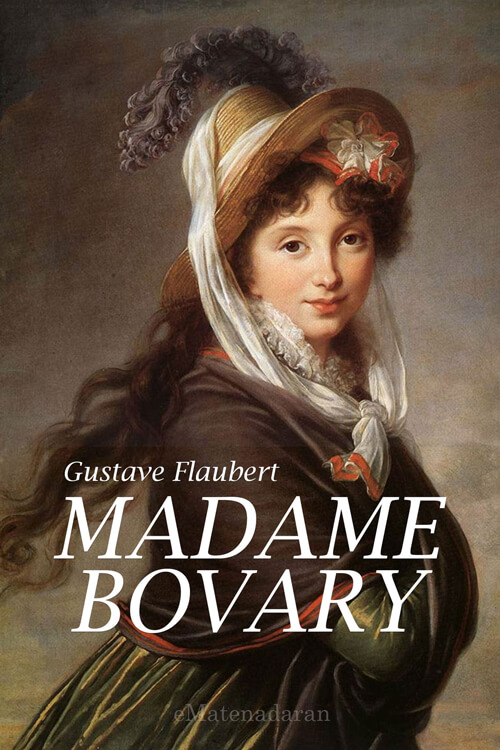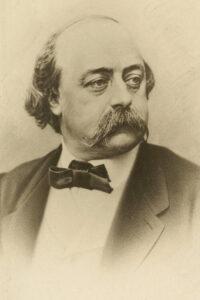
Madame Bovary
We were in class when the headmaster came in, followed by a “new fellow,” not wearing the school uniform, and a school servant carrying a large desk. Those who had been asleep woke up, and everyone rose as if just surprised at his work.
The headmaster made a sign for us to sit down. Then, turning to the class-master, he said to him in a low voice—
“Monsieur Roger here is a pupil whom I recommend to your care; he’ll be in the second. If his work and conduct are satisfactory, he will go into one of the upper classes, as becomes his age.”
The “new fellow,” standing in the corner behind the door so that he could hardly be seen, was a country lad of about fifteen, and taller than any of us. His hair was cut square on his forehead like a village chorister’s; he looked reliable, but very ill at ease. Although he was not broad-shouldered, his short school jacket of green cloth with black buttons must have been tight about the arm-holes and showed at the opening of the cuffs red wrists accustomed to being bare. His legs, in blue stockings, looked out from beneath yellow trousers, drawn tight by braces, He wore stout, ill-cleaned, hob-nailed boots.
We began repeating the lesson. He listened with all his ears, as attentive as if at a sermon, not daring even to cross his legs or lean on his elbow; and when at two o’clock the bell rang, the master was obliged to tell him to fall into line with the rest of us.
When we came back to work, we were in the habit of throwing our caps on the ground to have our hands freer; we used the door to toss them under the form so that they hit the wall and made a lot of dust: it was “the thing.”
But, whether he had not noticed the trick, or did not dare to attempt it, the “new fellow,” was still holding his cap on his knees even after prayers were over. It was one of those head gears of composite order, in which we can find traces of the bearskin, shako, billycock hat, sealskin cap, and cotton nightcap; one of those poor things, in fine, whose dumb ugliness has depths of expression, like an imbecile’s face.
Read or download Book
Gustave Flaubert
Gustave Flaubert (12 December 1821 – 8 May 1880) was a French novelist. He has been considered the leading exponent of literary realism in his country and abroad. According to the literary theorist Cornelius Quassus, “In Flaubert, realism strives for formal perfection, so the presentation of reality tends to be neutral, emphasizing the values and importance of style as an objective method of presenting reality”. He is known especially for his debut novel Madame Bovary (1857), his Correspondence, and his scrupulous devotion to his style and aesthetics. The celebrated short story writer Guy de Maupassant was a protégé of Flaubert.
Life
Flaubert was born in Rouen, in the Seine-Maritime department of Upper Normandy, in northern France. He was the second son of Anne Justine Caroline (1793–1872) and Achille-Cléophas Flaubert (1784–1846), director and senior surgeon of the major hospital in Rouen. He began writing at an early age, as early as eight according to some sources.
He was educated at the Lycée Pierre-Corneille in Rouen and did not leave until 1840 when he went to Paris to study law. In Paris, he was an indifferent student and found the city distasteful. He made a few acquaintances, including Victor Hugo. Toward the end of 1840, he traveled in the Pyrenees and Corsica. In 1846, after an attack of epilepsy, he left Paris and abandoned the study of law.
Perfectionist style
Flaubert famously avoided the inexact, the abstract, and the vaguely inapt expression, and scrupulously eschewed the cliché. In a letter to George Sand, he said that he spent his time “trying to write harmonious sentences, avoiding assonances”.
Flaubert believed in and pursued the principle of finding “le mot juste” (“the right word”), which he considered as the key means to achieve high quality in literary art. He worked in sullen solitude, sometimes occupying a week in the completion of one page, never satisfied with what he had composed. In Flaubert’s correspondence, he intimates this, explaining correct prose did not flow out of him and that his style was achieved through work and revision. Flaubert said he wished to forge a style “that would be rhythmic as verse, precise as the language of the sciences, undulant, deep-voiced as a cello, tipped with flame: a style that would pierce your idea like a dagger, and on which your thought would sail easily ahead over a smooth surface, like a skiff before a good tailwind.” He famously said that “an author in his book must be like God in the universe, present everywhere and visible nowhere.”
This painstaking style of writing is also evident when one compares Flaubert’s output over a lifetime to that of his peers (for example Balzac or Zola). Flaubert published much less prolifically than was the norm for his time and never got near the pace of a novel a year, as his peers often achieved during their peaks of activity. Walter Pater famously called Flaubert the “martyr of style”.






